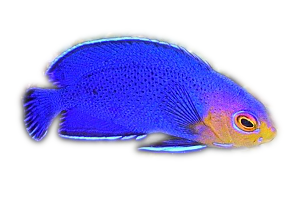
By Bob Goemans


Not Reef Tank Suitable
Not Suitable for Fish-Only Tank
These fishes belong in the Order Scorpaeniformes and Suborder Scorpaenoidei as members of the Family Scorpaenidae (Scorpionfishes) consisting of 11 Subfamilies, 45 genera, and 388+ species.
Lionfish, also known as Turkeyfish or Zebrafish, are without question one of the more attention getting fish than most other marine fishes. Not only do they have an array of gorgeous dorsal and pectoral fins, they are hardy, undemanding as to water quality, disease resistant, and their diet is somewhat easy to provide. They have two venom (a neurotoxin) containing glands located at the base of each dorsal spine. When agitated or frightened these fish are capable of springing forward and injecting the offending party, whether that may be another animal or the hand that feeds them, with a very painful toxin. The severity of reaction depends on the individual stung. A moderate level of discomfort may be experienced, while others may experience severe pain. A severe anaphylactic reaction may occur in some cases and require emergency medical treatment. If stung, immersing the wound in as hot as possible water that can be tolerated will help break down the venom and reduce the level of pain. Care is well advised when cleaning their aquarium or when feeding.
In the wild they are solitary nocturnal creatures, usually searching the reef for a meal. Their diet in the wild consists of small fishes and crustaceans and they vacuum-in anything within reach with their large mouth. Keep this in mind if you decide to house it with smaller fishes as they will be considered food and be eaten. Also, they are prone to fin nipping and should not be housed with any tankmates that will think their fins a good meal.
In the aquarium, the feeding of small freshwater live fish, e.g., guppies/mollies/goldfish feeders, should be considered an extra special treat and should not become a steady diet as it lacks some important fatty acids. Therefore lionfish should be trained to accept defrosted or freshly prepared marine shrimp and/or various kinds of marine fish flesh.
Keep in mind that goldfish feeders are not only NOT nutritious, but their cost will soon far out weigh the cost of the feedee. Feeder goldfish also carry many different bacteria, fungi, and protozoa that can cause parasitic and infectious diseases. They can also cause blockage in the digestive track, and/or kidney and liver damage in the feedee, which usually leads to the consumer's death.
Lionfish make good tankmates for moray eels and triggerfishes, however a large moray eel can easily eat a small lionfish without being stung.